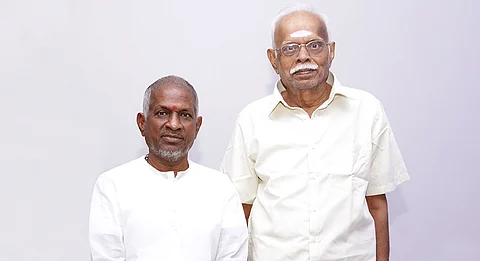
- In-Depth Stories
- Web Stories
- Reviews
- News
- FC Lists
- Interviews
- Features
- FC SpecialsFC Specials

Panchu Arunachalam, who passed away on August 9, 2016, wore many hats. He is remembered as a lyricist – he began that phase of his career by jotting down the words flowing from the legendary Kannadasan during recording sessions (starting with Kavalai Illadha Manidhan, 1960), and the first song he wrote on his own was the popular Manamagale marumagale vaa vaa (Sarada, 1962). He is remembered as a screenwriter – he began with the disastrous Nagesh vehicle, Hello Partner (1972). He is remembered as a dialogue writer – he began that journey with Thiruneelakandar (1972), starring TR Mahalingam. He is remembered as a producer – he began with Uravu Solla Oruvan (1975), with a production house he named Filmalaya. It featured Muthuraman, Sujatha, Sivakumar and Padmapriya. He is remembered as a star-maker. Rajinikanth has said that, though he was introduced and groomed by K Balachander, it was Panchu Arunachalam who reoriented his career trajectory towards superstardom.
But most of all, Panchu Arunachalam is remembered as the man who brought Ilayaraja to Tamil cinema, with Annakkili (1976). The basic superhero origin story stays the same, though – depending on who tells it – a few details may differ. Here's the story that Panchu Arunachalam narrates in G Dhananjayan's documentary, A Creator with Midas Touch. (The name sounds better in Tamil: Thottadhellaam Ponnaakkiya Padaippaali.) So here he is, having produced a big hit in Thunive Thunai (1976), a James Bond-style adventure, starring Jaishankar. The innovations in the film include Tamil cinema's first climax-action sequence involving a helicopter, and having the bad guys being led by Rajasulochana. You'll probably laugh at it today, but it's quite something in the Nambiar-Asokan era to say you want a woman as the antagonist.
There are no instruments, and so, using a table as percussion, Raja taps out beats and sings every single song that will make it to Annakkili
So now, Panchu Arunachalam is thinking about his next film, and he's also thinking about why a Tamil hit (Thunive Thunai) is bringing in Rs. 1.70 lakh, while a Hindi hit (Bobby) is grossing Rs. 4.25 lakh, an amount that even MGR and Sivaji Ganesan films find impossible to make. He decides it's the music, and that it's time to find a new composer. People around him say: "Why not Vijayabhaskar again?" After all, he did compose the music for Panchu Arunachalam's first film as producer, Uravu Solla Oruvan. But Panchu Arunachalam is determined he wants someone new, and then the writer-director R Selvaraj says he knows a young composer called Raja who has a stash of songs recorded on spool tape.
Panchu Arunachalam remembers a thin, young man with his shirt tucked into his pants. After some ice-breaking chitchat, the producer decides he wants to see what this young man has got. There are no instruments, and so, using a table as percussion, Raja taps out beats and sings every single song that will make it to Annakkili, directed by Devaraj-Mohan. Bharathiraja, who will debut with 16 Vayathinile a year later, will come to be known as the director who took Tamil cinema from the studios to the great, wide-open spaces of the countryside, but watch Annakkili today, and you will be surprised at how much of this film, set in a village, is actually shot in a village.
Aside No. 1: Could it be that Annakkili was in black and white, and the rustic surroundings popped out more in the full-colour glory of 16 Vayathinile? A look at Anandha Vikatan's review of Annakkili, published on May 30, 1976, suggests as much. The last line says, "Looking at the beautiful village scenes, you wonder if the film would have been better in colour.") Aside No. 2: Coming back to Ilayaraja, just how strange does Vikatan, known for its film reviews, feel today that there's not one mention of the film's music, or its new composer. After setting up the film with bits of plot, the review praises the heroine (Sujatha), the hero (Sivakumar), the supporting cast (Srikanth). Then, a few flaws are pointed out. The directors are lauded for the climax. And then, this line wondering what the film would have been like in colour.
But then, being ignored by the most prestigious review in town would have just been the latest setback for the music director. To counter the "Why not Vijayabhaskar?" cries (translation: "Does this newbie have it in him?"), he hires a full orchestra – like in a live concert – to play behind singers (SP Balasubrahmaniyam, S Janaki, and so forth) at Venkateshwara Marriage Hall, Panagal Park. Panchu Arunachalam is satisfied, but the day the first song is to be recorded, there's a power cut. Panchu Arunachalam persists, unshaken by "bad omen" murmurs. The power supply is restored, the recording takes place, but the track isn't recorded – someone forgot to switch on the recording device. Panchu Arunachalam persists.
When it's time for the film's release, Panchu notes that the composer, who calls himself D Raja, needs a catchy name
Later, when it's time for re-recording (as composing the background score is known), people complain about this new man's pace. "He's just completed one reel in the pre-lunch session, and one reel in the post-lunch session. Had it been Vijayabhaskar, the whole film would have been scored in a day." Panchu Arunachalam persists. When it's time for the film's release, he notes that the composer, who calls himself D Raja, needs a catchy name. He rejects the composer's suggestion that the music be credited to him and his siblings, "Pavalar Brothers." He says that makes it sound like a bus company. What about Raja, then? But there's already an AM Raja. "Maybe we could call you Junior Raja… But that's too English…. What if we say 'junior' in Tamil… Ilaya-raja does sound nice…"